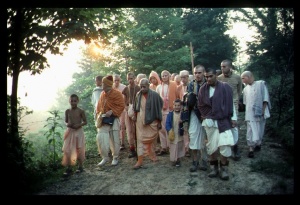SB 3.14.31

A.C. Bhaktivedanta Swami Prabhupada
TEXT 31
- sa viditvātha bhāryāyās
- taṁ nirbandhaṁ vikarmaṇi
- natvā diṣṭāya rahasi
- tayāthopaviveśa hi
SYNONYMS
saḥ — he; viditvā — understanding; atha — thereupon; bhāryāyāḥ — of the wife; tam — that; nirbandham — obstinacy; vikarmaṇi — in the forbidden act; natvā — offering obeisances; diṣṭāya — unto worshipable fate; rahasi — in a secluded place; tayā — with her; atha — thus; upaviveśa — lay; hi — certainly.
TRANSLATION
Understanding his wife's purpose, he was obliged to perform the forbidden act, and thus after offering his obeisances unto worshipable fate, he lay with her in a secluded place.
PURPORT
It appears from the talks of Kaśyapa with his wife that he was a worshiper of Lord Śiva, and although he knew that Lord Śiva would not be pleased with him for such a forbidden act, he was obliged to act by his wife's desire, and thus he offered his obeisances unto fate. He knew that the child born of such untimely sexual intercourse would certainly not be a good child, but could not protect himself because he was too obligated to his wife. In a similar case, however, when Ṭhākura Haridāsa was tempted by a public prostitute at the dead of night, he avoided the allurement because of his perfection in Kṛṣṇa consciousness. That is the difference between a Kṛṣṇa conscious person and others. Kaśyapa Muni was greatly learned and enlightened, and he knew all the rules and regulations of systematic life, yet he failed to protect himself from the attack of sex desire. Ṭhākura Haridāsa was not born of a brāhmaṇa family, nor was he himself brāhmaṇa, yet he could protect himself from such an attack due to his being Kṛṣṇa conscious. Ṭhākura Haridāsa used to chant the holy name of the Lord three hundred thousand times daily.